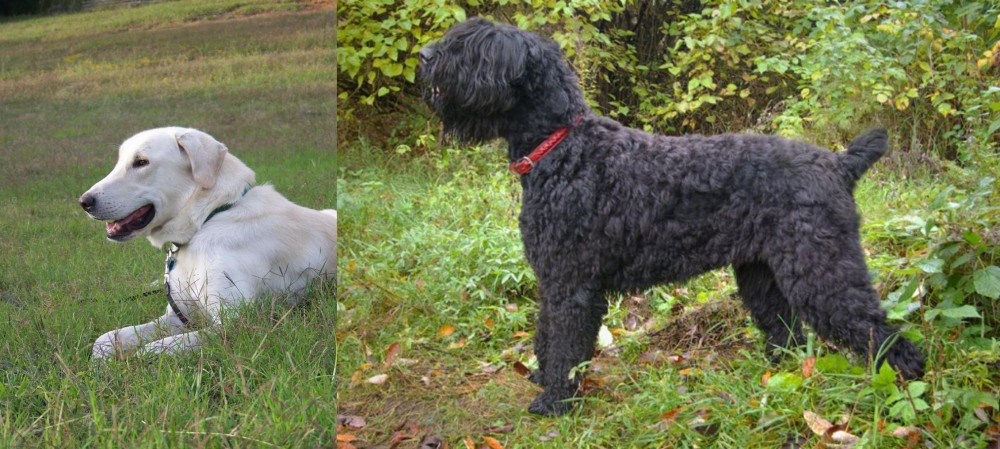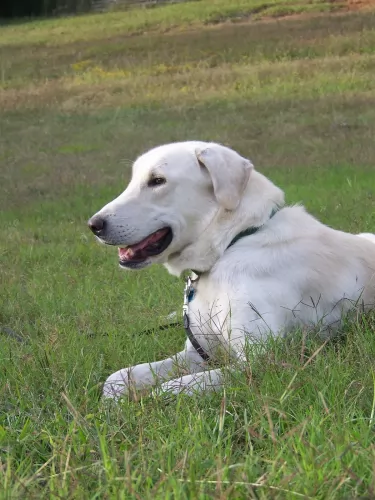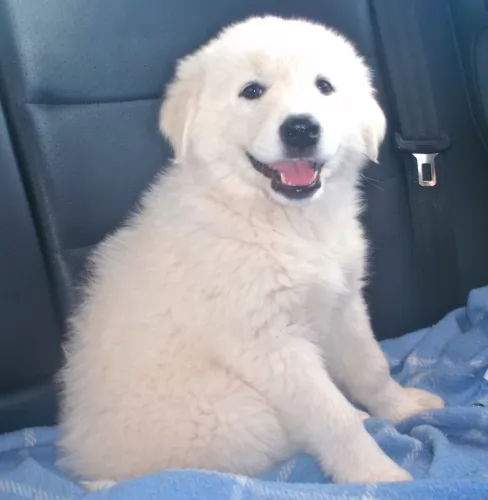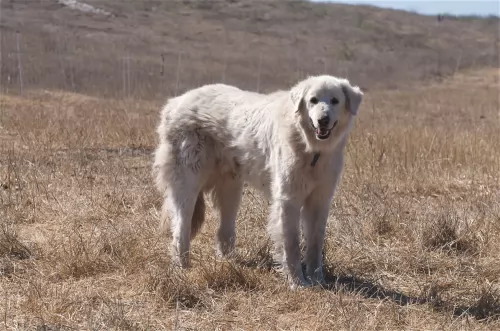 Petzlover
Petzlover Akbash Dog is originated from Turkey but Black Russian Terrier is originated from Russia. Akbash Dog may grow 8 cm / 4 inches higher than Black Russian Terrier. Both Akbash Dog and Black Russian Terrier are having almost same weight. Akbash Dog may live 3 years less than Black Russian Terrier. Akbash Dog may have less litter size than Black Russian Terrier. Akbash Dog requires Moderate Maintenance. But Black Russian Terrier requires High Maintenance
Akbash Dog is originated from Turkey but Black Russian Terrier is originated from Russia. Akbash Dog may grow 8 cm / 4 inches higher than Black Russian Terrier. Both Akbash Dog and Black Russian Terrier are having almost same weight. Akbash Dog may live 3 years less than Black Russian Terrier. Akbash Dog may have less litter size than Black Russian Terrier. Akbash Dog requires Moderate Maintenance. But Black Russian Terrier requires High Maintenance
 Akbash breed became popular in the 1970s. Around that period, Akbash was introduced to North America. There is archeological evidence that this breed was popular even in the 750-300 BC. Of course, it wasn’t the exact dog as we know it today, but there are many similarities between Akbash and dog from the ancient period. This breed was developed in Turkey to be a guardian dog. They were perfect flock guardians.
Akbash breed became popular in the 1970s. Around that period, Akbash was introduced to North America. There is archeological evidence that this breed was popular even in the 750-300 BC. Of course, it wasn’t the exact dog as we know it today, but there are many similarities between Akbash and dog from the ancient period. This breed was developed in Turkey to be a guardian dog. They were perfect flock guardians.
 During the cold war, the Soviet Union developed the Black Russian Terrier as a working military dog. During the early 1950’s, the Red Star Kennel developed this breed and in 2004 by the American Kennel Club. The Black Russian Terrier is not really a terrier at all, but a mid-sized working dog used for hunting and guarding or as a pet. The Red Star Kennel is thought to have developed the BRT using a wide variety of breeds – as many as seventeen – including breeds like the Newfoundland, the Rottweiler, the Caucasian Shepard Dog and a Giant Shepard and an Airedale. So, you can see the wide variety and several more breeds were added. The Red Star Kennel in Moscow was owned by the state and they developed the BRT for specific working conditions and not for appearance. They did not really care how it looked except that it had to be black. In 1957 the state allowed a few puppies to be sold to non-military breeders. These breeders began to breed the Black Russian Terrier for appearance as well as function.
During the cold war, the Soviet Union developed the Black Russian Terrier as a working military dog. During the early 1950’s, the Red Star Kennel developed this breed and in 2004 by the American Kennel Club. The Black Russian Terrier is not really a terrier at all, but a mid-sized working dog used for hunting and guarding or as a pet. The Red Star Kennel is thought to have developed the BRT using a wide variety of breeds – as many as seventeen – including breeds like the Newfoundland, the Rottweiler, the Caucasian Shepard Dog and a Giant Shepard and an Airedale. So, you can see the wide variety and several more breeds were added. The Red Star Kennel in Moscow was owned by the state and they developed the BRT for specific working conditions and not for appearance. They did not really care how it looked except that it had to be black. In 1957 the state allowed a few puppies to be sold to non-military breeders. These breeders began to breed the Black Russian Terrier for appearance as well as function.
As these breeders worked with the dogs, they spread the breed throughout Russia and into Finland, Poland, Hungary, Germany, Czechoslovakia and Germany. From there they spread to Australia, Canada and the United States. The breed standard was developed in 1958 and by 1996 an updated version of the standard was developed to reflect the dog we see today. In 1996 the United Kingdom also got their first introduction to the breed. They are still rare outside of Russian or previous Soviet Union states.
 Weight of the Akbash dog variates from 41-64kg, while their height is 71-78cm. Female Akbash is smaller than a male Akbash, but not for much.
A lifespan of an average Akbash dog is 10-11 years, but if they have cared properly, they tend to live longer.
Litter Size of Akbash is 8-9 puppies.
Another Name for Akbash is Akbas Coban Kopegi, Coban Kopegi.
Weight of the Akbash dog variates from 41-64kg, while their height is 71-78cm. Female Akbash is smaller than a male Akbash, but not for much.
A lifespan of an average Akbash dog is 10-11 years, but if they have cared properly, they tend to live longer.
Litter Size of Akbash is 8-9 puppies.
Another Name for Akbash is Akbas Coban Kopegi, Coban Kopegi.
 A little larger than a mid-sized dog, the Black Russian Terrier is strong, powerful, stable and alert. His head is block shaped and has a broad skull. The muzzle is square with a beard and mustache. A black, large nose and full black lips are matched with powerful and large jaws. He has a scissor bite and his ears should be triangles with rounded apexes. They have very large paws that are bear-like in appearance with thick black pads. They are also covered with hair. Their legs are muscular, powerful and strong. They have a cropped tail.
A little larger than a mid-sized dog, the Black Russian Terrier is strong, powerful, stable and alert. His head is block shaped and has a broad skull. The muzzle is square with a beard and mustache. A black, large nose and full black lips are matched with powerful and large jaws. He has a scissor bite and his ears should be triangles with rounded apexes. They have very large paws that are bear-like in appearance with thick black pads. They are also covered with hair. Their legs are muscular, powerful and strong. They have a cropped tail.
 Have in mind that Akbash is a large and powerful dog. They are bred through generations to be guardians and suspicious. They are very independent because they tend to make their own decisions while guarding flocks. They will require adequate socialization, but overall, they are very intelligent and they tend to learn quickly. It requires time and patience, but are great pets for right owners. Akbash has a white to biscuit color coat. They also have a dark pigment around nose, eyes, and mouth. Akbash is very quick and agile dog, which might be surprised because of its size.
Have in mind that Akbash is a large and powerful dog. They are bred through generations to be guardians and suspicious. They are very independent because they tend to make their own decisions while guarding flocks. They will require adequate socialization, but overall, they are very intelligent and they tend to learn quickly. It requires time and patience, but are great pets for right owners. Akbash has a white to biscuit color coat. They also have a dark pigment around nose, eyes, and mouth. Akbash is very quick and agile dog, which might be surprised because of its size.
It is important to train them since the puppyhood. They are working dogs and they will be happy when they have tasks during training. Due to their independence, consistent and steady training is important. An old-fashioned way of training that includes punishment is not recommendable. Positive training with awards is the best way to train your Akbash dog. They do not require a lot of daily exercises. Daily walks would do more than enough. Younger dogs need more exercise than more mature ones. They can be very good for other animals, but they have to be socialized with them. It is the best way to socialize your dog when it is still a puppy.
 The Black Russian Terrier is a working dog and he is confident, calm, self-assured and confident. He is responsive and intelligent, protective and fearless, loyal and aloof. He is not welcoming to strangers. If socialized well, he is enough of an independent thinker to be able to decide on his own who or what poses a threat to his family and what doesn’t. They get bored quickly because they are so smart. Keep him stimulated. These are strong, athletic dogs who will love to run with you, jog along side your bike, hike the mountain or just walk with you. Whatever your form of exercise is, the Black Russian Terrier can adapt to it. They also have a strong prey drive so don’t trust them with animals they do not know. They are ok with cats and dogs that they grow up with. They love to play with kids but be careful they don’t unintentionally knock the little ones down.
The Black Russian Terrier is a working dog and he is confident, calm, self-assured and confident. He is responsive and intelligent, protective and fearless, loyal and aloof. He is not welcoming to strangers. If socialized well, he is enough of an independent thinker to be able to decide on his own who or what poses a threat to his family and what doesn’t. They get bored quickly because they are so smart. Keep him stimulated. These are strong, athletic dogs who will love to run with you, jog along side your bike, hike the mountain or just walk with you. Whatever your form of exercise is, the Black Russian Terrier can adapt to it. They also have a strong prey drive so don’t trust them with animals they do not know. They are ok with cats and dogs that they grow up with. They love to play with kids but be careful they don’t unintentionally knock the little ones down.
The Black Russian Terrier matures later than other dogs. Treat the puppy the way you want the adult dog to be. If you don’t want a large dog on your bed don’t let the puppy sleep on the bed. He will soon be a large, powerful and strong dog with a mind of his own and you will not be able to keep him off the bed.
 This is a healthy breed who faces some of the same issues other large dogs face such as dysplasia in the elbows and hips. Then they also face their own hereditary diseases such as Juvenile laryngeal paralysis, hyperuricosuria and polyneuropathy. They are also susceptible to heart disease, eye diseases, allergies, Panosteitis and hypertropic osteodystrophy. Let’s look at the major hereditary disease that are not so common.
This is a healthy breed who faces some of the same issues other large dogs face such as dysplasia in the elbows and hips. Then they also face their own hereditary diseases such as Juvenile laryngeal paralysis, hyperuricosuria and polyneuropathy. They are also susceptible to heart disease, eye diseases, allergies, Panosteitis and hypertropic osteodystrophy. Let’s look at the major hereditary disease that are not so common.
This occurs when the larynx arytenoid cartilages stop working and don’t operate so then the adjoining muscles don’t work either and the dog cannot swallow without the possible damage to the airway and the cannot breathe properly during exercise or while panting.
This is a condition that can occur in people and animals. This condition can lead to kidney or bladder stones as there is too much uric acid in their urine.
Like any form of neuropathy, in this disease many different nerves are damaged, and this can cause weak reflexes and tremors. There are effective treatments however.
 Akbash dog is very easy to care. They can stay fit on a minimum amount of food. 2-2.5 cups divided into two meals would be ideal for your dog. They require meat, so giving them dry industrial food can be a solid substitute. Vegetables and oil can also be included in meals. It will keep your dog healthy and happy.
Akbash dog is very easy to care. They can stay fit on a minimum amount of food. 2-2.5 cups divided into two meals would be ideal for your dog. They require meat, so giving them dry industrial food can be a solid substitute. Vegetables and oil can also be included in meals. It will keep your dog healthy and happy.
Puppies have to eat more meals per day. It is the best to give your puppy Akbash 3-5 meals per day. Those meals should be divided into smaller portions. It is recommended to give your puppy all necessary vitamins and minerals that include calcium for stronger bones. It will improve the overall health of your dog, and it will help it develop into a healthy adult dog.
Akbash will request some grooming, but they are not very difficult to groom. They require regular grooming. Every few days will be enough, except when they are shedding. Akbash will need daily grooming when shed. You can bath your pet occasionally, but not very often. Bathing, if necessary, should be done only 5-6 times a year. There is no need for more.
 This is a large, working dog that needs healthy nutrition. Feed once or twice a day but do not overfeed. Don’t let your Black Russian Terrier get overweight. Proper nutrition for puppies is critical given the nutrionally based diseases discussed below.
This is a large, working dog that needs healthy nutrition. Feed once or twice a day but do not overfeed. Don’t let your Black Russian Terrier get overweight. Proper nutrition for puppies is critical given the nutrionally based diseases discussed below.
This is a high energy dog that needs to work. He doesn’t just want to work, he needs to work. So, find him a job and one that includes a lot of exercise. He needs consistent and firm training but will respond well and excel in Obedience Trials. They are good at Schutzhund and agility. They need plenty of exercise and will be unhappy and destructive without enough and a job. He needs to burn off that energy.